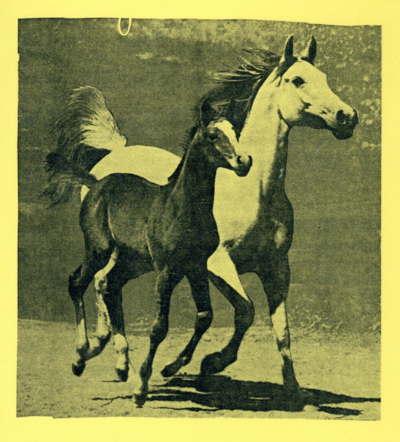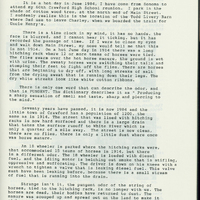163
Item
-
Title
-
163
-
Transcription
-
THE CHANGING ORORS OF TIME
It is a hot day in June 1984, I have come from Sonoma to attend my 60th Crawford High School reunion. I park in the shade of cotton wood tree, at the north end of Main Street. I suddenly realize this is the location of the Todd Livery Barn where Dad use to leave Charley, when we boarded the train for Uncle Henry's.
There is a time clock in my mind, it has no hands, the face is blurred, and I cannot hear it ticking, but it has recorded the passage of time. If I were to close my eyes and walk down Main Street, my nose would tell me that this is not 1914. On a hot June day in 1914 there was a long hitching rack where 12 or more teams of horses were tied. The flies swarm over the hot horse manure, the ground is wet with urine. The sweaty horses were switching their tails and stomping their feet to fight off the flies. There are horses that are beginning to dry off, with long streaks of salt from the drying sweat that is running down their legs. The dry white streaks look like white cotton ribbons.
There is only one word that can describe the odor, and that is PUNGENT. The dictionary describes it as " Producing a sharp sensation of smell and taste, sharp and piercing to the mind."
Seventy years have passed, it is now 1984 and the little town of Crawford has a population of 1200 [sic], the same as in 1914. The street that was lined with hitching racks is now hard surfaced and there is a large drain that takes the surface runoff to White River which is only a quarter of a mile away. The street is now clean, there are no flies, there is only a little dust where once was horse manure.
An 18 wheeler is parked where the hitching racks were, that accommodated 15 teams of horses in 1914, but there is a different odor. The 18 wheeler is loaded with diesel fuel, and the idling motor is belching out smoke that is stifling, oppressive and suffocating. The driver is down on his knees with a wrench to tighten a valve that is leaking diesel fuel. This valve must have been leaking before, because there is a small stream of fuel that is running into the drain.
Strange isn't it, the pungent odor of the string of horses, tied to the hitching rack, is no longer with us. The horses are dead, their bodies have returned to dust. The manure was scooped up and spread out on the land to make it richer and more productive. What of the diesel fuel that ran into the drain, and then into the river? Where does the carbon monoxide go that is coming from the idling motor?
-
Rights
-
To inquire about usage, please contact Archives & Special Collections, University of Nebraska-Lincoln Libraries. These images are for educational use only. Not all images are available for publication.
 Metzger Memories
Metzger Memories
 Metzger Memories
Metzger Memories
